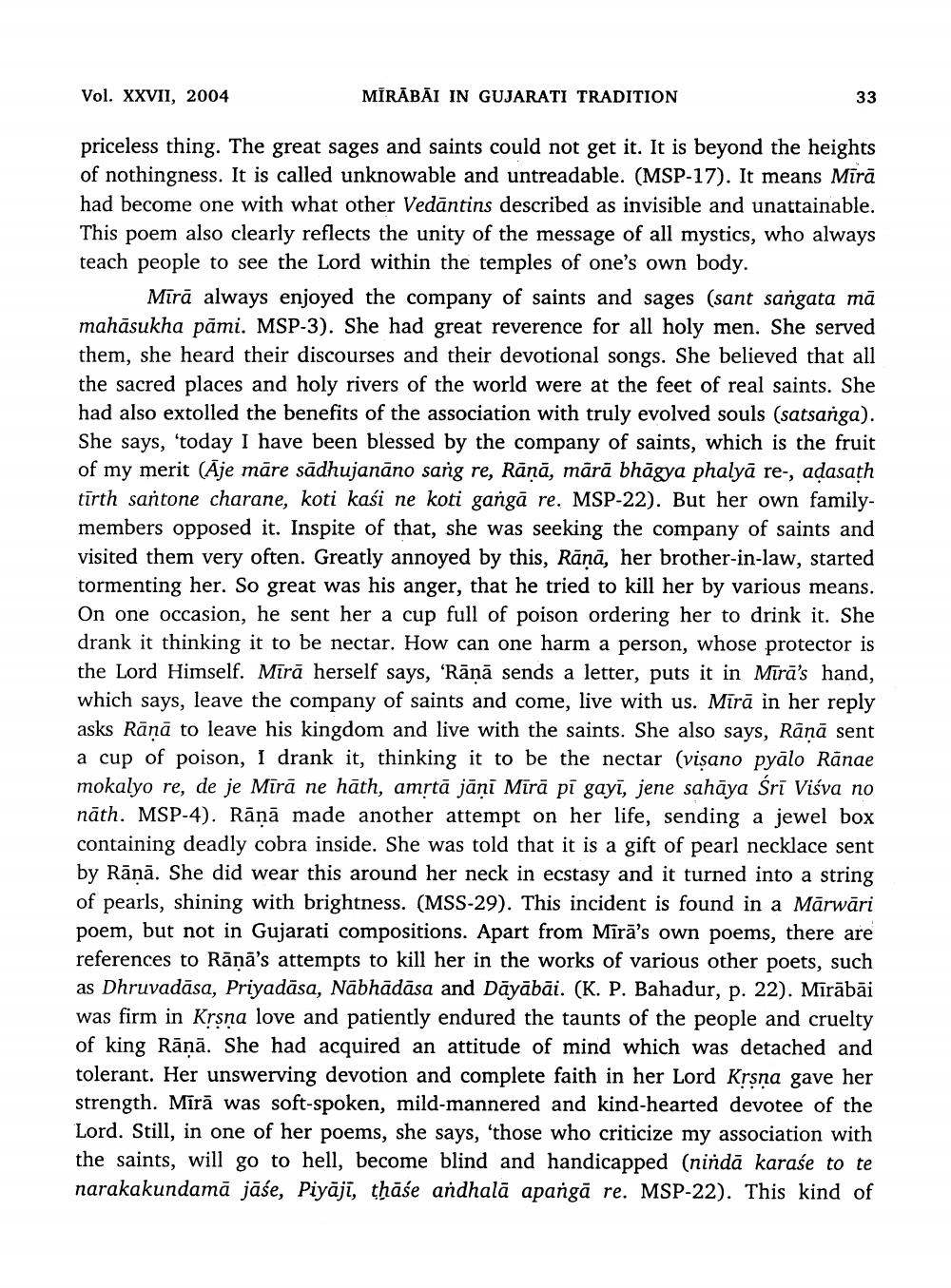________________
Vol. XXVII, 2004
MĪRĀBĀI IN GUJARATI TRADITION
33
priceless thing. The great sages and saints could not get it. It is beyond the heights of nothingness. It is called unknowable and untreadable. (MSP-17). It means Mīrā had become one with what other Vedāntins described as invisible and unattainable. This poem also clearly reflects the unity of the message of all mystics, who always teach people to see the Lord within the temples of one's own body.
Mīrā always enjoyed the company of saints and sages (sant sangata mā mahāsukha pāmi. MSP-3). She had great reverence for all holy men. She served them, she heard their discourses and their devotional songs. She believed that all the sacred places and holy rivers of the world were at the feet of real saints. She had also extolled the benefits of the association with truly evolved souls (satsanga). She says, 'today I have been blessed by the company of saints, which is the fruit of my merit (Āje māre sādhujanāno sang re, Rāņā, mārā bhāgya phalyā re-, adasath tīrth santone charane, koti kaśi ne koti gangā re. MSP-22). But her own familymembers opposed it. Inspite of that, she was seeking the company of saints and visited them very often. Greatly annoyed by this, Rāņā, her brother-in-law, started tormenting her. So great was his anger, that he tried to kill her by various means. On one occasion, he sent her a cup full of poison ordering her to drink it. She drank it thinking it to be nectar. How can one harm a person, whose protector is the Lord Himself. Mīrā herself says, 'Rānā sends a letter, puts it in Mīrā's hand, which says, leave the company of saints and come, live with us. Mīrā in her reply asks Rānā to leave his kingdom and live with the saints. She also says, Ranā sent a cup of poison, I drank it, thinking it to be the nectar (vişano pyālo Rānae mokalyo re, de je Mirā ne hāth, amrtā jāni Mīrā pi gayī, jene sahāya Sri Viśva no nāth. MSP-4). Rānā made another attempt on her life, sending a jewel box containing deadly cobra inside. She was told that it is a gift of pearl necklace sent by Rānā. She did wear this around her neck in ecstasy and it turned into a string of pearls, shining with brightness. (MSS-29). This incident is found in a Mārwāri poem, but not in Gujarati compositions. Apart from Mirā's own poems, there are references to Rānā's attempts to kill her in the works of various other poets, such as Dhruvadāsa, Priyadāsa, Nābhādāsa and Dāyābāi. (K. P. Bahadur, p. 22). Mīrābāi was firm in Krsna love and patiently endured the taunts of the people and cruelty of king Rāņā. She had acquired an attitude of mind which was detached and tolerant. Her unswerving devotion and complete faith in her Lord Krsna gave her strength. Mīrā was soft-spoken, mild-mannered and kind-hearted devotee of the
in one of her poems, she says, 'those who criticize my association with the saints, will go to hell, become blind and handicapped (nindā karaśe to te narakakundamā jāśe, Piyājī, thāśe andhalā apangā re. MSP-22). This kind of




